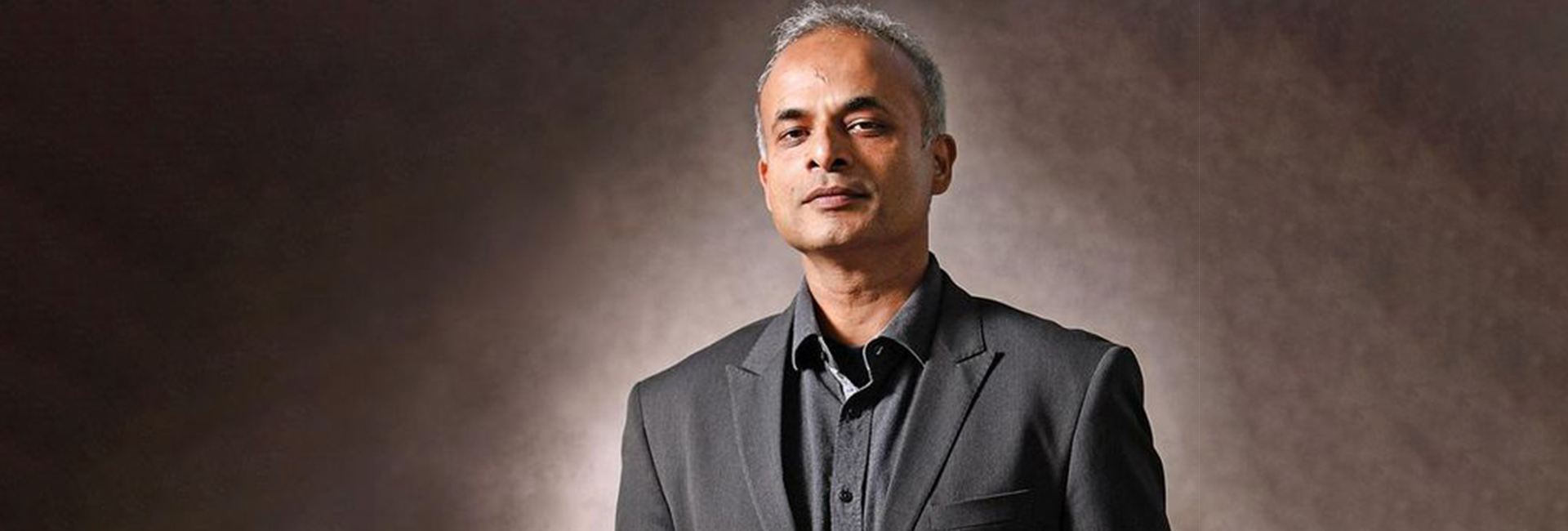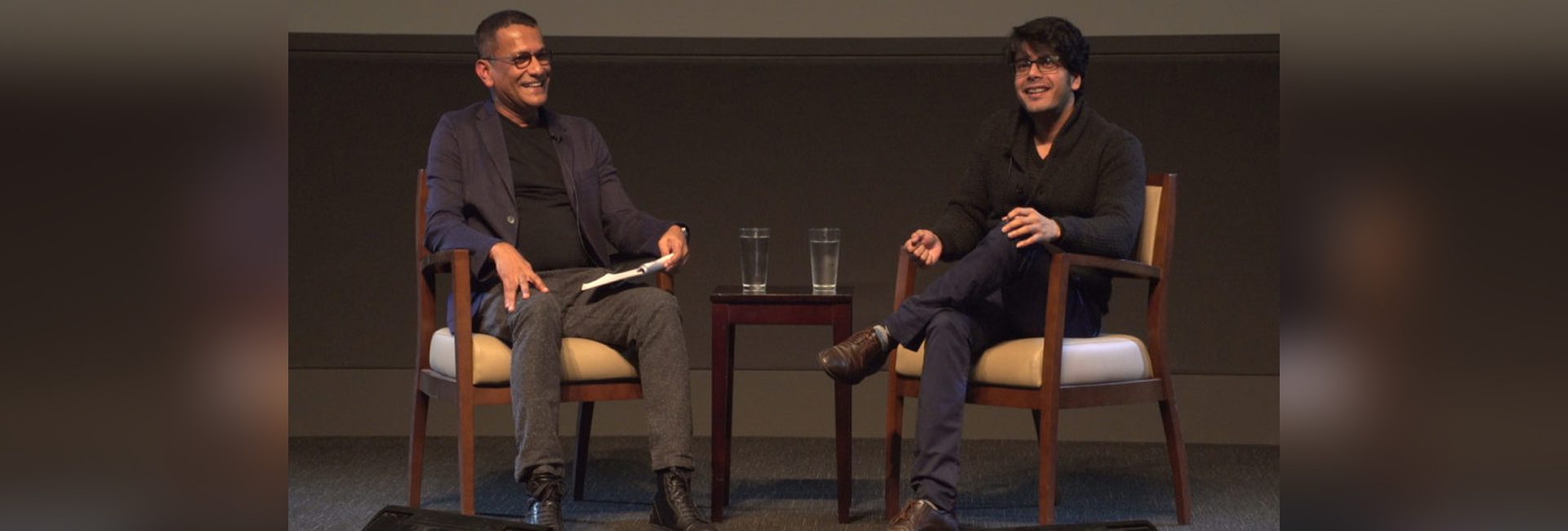He’s one of India’s top writers and journalists, currently a columnist in Mint, the former editor-in-chief of Open (back in the heyday of journalism in India), the creator of Netflix’s hit series, Decoupled, and the author of three books – Serious Men, The Illicit Happiness of Other People and Miss Laila: Armed and Dangerous. Manu Joseph sat down with Global Indian at the Bangalore Literature Festival 2022 to talk about his life, a middle-class childhood in Madras, working his way through college and grappling with trauma at a time when society lacked the vocabulary to fully articulate grief.
(January 4, 2022) Back in 2017, when Manu Joseph and I sat in the authors’ lounge at the Bangalore Literature Festival – he had graciously granted me an interview – the first question came out of me in a rush – “What have you been through, Manu, to write something like The Illicit Happiness of Other People?” He only smiled, saying, “I can’t think of anything in particular.” Still, I was pretty convinced that such writing cannot come through merely observing sorrow in others, it’s impossible that the author had not experienced a journey of his own. But he wasn’t telling. Not then, anyway.
My answer came five years later, a few weeks ago in December, at BLF 2022, as we sat down together again for an interview with Global Indian. He’s had a string of successes in the intervening years, including Netflix adaptation of Serious Men and becoming the creator of the very popular series, Decoupled. And this time around, Manu decides to speak, granting me a glimpse of depths that underly the master of satire. It’s like being in a JD Salinger novel, Franny and Zooey, maybe – but one doesn’t say these things to Manu Joseph, not unless you want him to make fun of you. Sure enough, he remarks a few moments later, “One kind of boring conversation is when people are quoting others, either to show what they have read or because they don’t have an original idea. When you’re sixteen, you’re talking about what you feel.”

Manu Joseph
Observations on grief
That sixteenth year was crucial to Manu’s life. Looking back, he knows it to be adolescence trauma, “but at that age, we had no labels. There was no such thing as depression of trauma. If you are sad, you make yourself happy. You just live. It was that kind of situation. That’s when a friend, another sixteen year old, sat him down one day and asked, “What we see around us, through our eyes, is not the real stuff.” The observation stunned him. Teenagers usually talked about cricket or girls; in Madras they spoke about Brilliant Tutorials. And he had never considered, really, that conversations could be like this, that this sort of thing can be spoken and that it can actually make sense.
“I had not thought about this before. It is a different genre of conversation. As you grow, you speak about different things and discover the different things you can speak about,” he says. The friend had tried to have that conversation before, unsuccessfully, with several people. For a month, the boys had a series of intense conversations, pondering the meaning of life, much like his posthumously-described protagonist, Unni, in The Illicit Happiness Of Other People. The idea of a universal truth, of hitting on a magic formula that allowed you to see the why and how of everything, was intoxicating to a teenager struggling with yet-unnamed demons, who spent his time reading Rushdie and Hawking.
The pursuit of enlightenment
Manu calls it the most important thing, “Even today, it is most important thing that happened to me. It defined my character. Nothing changes your character but if it had 10 ways in which it could manifest itself, this was the early event that gave me direction. The idea that my reality was an illusion and that the true reality had to be pursued through ancient techniques made me immensely happy, partly because my life was not very good then and the idea that it was a part of illusion was fantastic. So, just like that, I believed deeply that there was something out there and a certain technique can help you get it.” It would go on to become the stuff of a very successful novel but back then, he says, “It was my life. It defined me through my twenties and influenced everything I did.”
Growing up with a journalist father and a very religious mother, Manu was 12 when he decided he was an atheist. Being middle-class meant being closer to the poor than to the rich, “I remember, all the rich people were called ‘smugglers’, it became another word for the rich,” he says. “The rich were also supposed to be unhappy. I remember my mom saying things like, ‘Look at that woman in the car, didn’t she look unhappy’?” These were the ideas with which one grew up, where even ambition, which Manu says he never lacked, became an act of rebellion. “You want to be rich and you want to be happy but you still think that the wealthy are unhappy.”

The power of misconception
Driven, Manu says, by “misconception,” he chose journalism, just as his father had done. He was supposed to study engineering, as all Indian boys his age were doing but picked literature in the end. “Misconceptions are so powerful, they give you direction. I had misconceptions about writing. And that saved me. If I had known too much, I would have tried to escape from the writing.” He was acting on intuition, “a subterranean knowledge,” as he puts it, which came mainly from ignorance. He had wanted to write for films but in his teens, as he discovered Salman Rushdie, Stephen Hawking, Wodehouse and Arthur Hailey, he decided he would write a novel.
“I did pursue filmmaking through my twenties but nobody I knew had the capacity to make films. But as I read, Western culture took over me. Also, I realised that I didn’t have to collaborate with anyone to write a novel, or need funds to finish.” In his mind at the time, it was all pretty straightforward – he would write a novel, it would be great and people would want to publish it.
It led him to a “very bad journalism course” in Madras Christian College. Circumstances weren’t easy, financially speaking and Manu had to take care of his own fees. He was twenty by then and had no choice but to work. He liked the Indian Express and approached them, but was told that interns weren’t paid. “I badly needed the money.”
Catching a break
The answer found him. Someone walked up to him in the college canteen, holding up an ad by Magna Publications. “I don’t remember this guy’s face but if he had not shown me this, a whole string of things would never have happened,” Manu recalls. He was interviewed by Ingrid Alberquerque and was given the job at Magna. He dropped out of college and moved to Mumbai. “From there, I jumped to Outlook.” He went on to become editor-in-chief at Open the Magazine, until he quit in 2014, announcing his resignation on Facebook.
By then, he had already written two novels – the first, Serious Men, came in 2010 and won the Hindu Literary Prize and the PEN / Open Book Award and was adapted as a feature film by Sudhir Mishra. Two years later, in 2012, came The Illicit Happiness of Other People, followed by Miss Laila, Armed and Dangerous in 2017. “I started writing my first novel in my early twenties,” he says, dismissing the idea that he started young. “When you look back, though, it seems silly, you don’t have life experiences to fill a novel. It’s either light or pretentious or fake. But sometimes you just want to write it anyway.”
It’s a problem that most Indian writers face, Manu remarks. “We feel that the novel has to be grand, it has to be very important. I still have that problem.” In fact, when he came up to say hello the previous day, he said, about writing another book, “Novels need worthy subjects.”

Nawazuddin Siddiqui in Serious Men
The ‘humility’ of screenplays
In 2020, he returned to screenplays, joining director Sudhir Misra for the Netflix adaptation of Serious Men. Then came Decoupled, with R. Madavan starring as the frank-talking Arya Iyer, whom haters were swift to label “toxic”. Opeds were written about the show’s ideology but it did become the second-most watched show on Netflix a mere three days after its release. “Many asparagus-eating friends have written privately to me to say they enjoyed Decoupled. I see that they are restrained in publicly sharing this view to appease the more delicate,” Manu tweeted. Screenplay writing taught him, he says, to take himself less seriously. “There is humility in a screenplay that is not required in a novel. A novel does not require the inconvenience of humility. A novel need not try to reach out to you; it is often created in a pure state and waits for the readers to come find it. Also, a screenplay is simpler. I cannot take you inside the head of the character. Film writers will disagree but that is because they don’t realise that most of a literary novel is about characters thinking. In a film, generally, I can only say what I can show.
The process of screenwriting, in my adult life, and the sheer number of columns I write every year, has led to its own evolution. “I’m moving away from beautiful prose,” he says. “I used to be incapacitated by the beginning, the beginning of any kind of writing. I used to spend ten hours just to get the start of a column right. I must have been so full of myself. Today, I don’t mind starting even a novel with ‘She was having coffee’. I have no problem with that. I may not downgrade myself so much that I’ll ever start a novel with a recipe, but yes I’ll begin with an ordinary, unremarkable sentence.”
The process has led to its own evolution. “I’m moving away from beautiful writing,” he says. “I don’t mind starting a novel with ‘She was having coffee’. I have no problem with that.” There is a novel in the pipeline, he says, one that’s different from anything he’s done so far. “I’m not afraid of melancholy now. Even with Illicit…, I was holding back, afraid to go too deep. I don’t mind deriving power now from something melancholic. I’m not responsible for your happiness, I’m not your dad, I’m a writer.”
The end of the pursuit
That moment with his friend, of discovering a new dimension to life itself, Manu says, was like “going through a slum in Madras and then suddenly finding yourself in Switzerland. I had escaped, forever.” He was the boy who was saved by hope so it’s a bit of a jolt when he says now, “I no longer believe in that. I don’t believe there’s something out there. I once believed that you can reach a state of being where you comprehend everything, I don’t believe that anymore. That search has done its job, it has defined my character.”
So, he has turned his focus instead to staying very fit, tapping into his ambition and all his ‘materialism of vanity,’ which he says is different from the ‘materialism of gluttony’. “I have complete disdain for mediocrity, especially in myself. If you’re lucky enough to be healthy, you can’t just let yourself go, you know? I can go to any length to do what is right for me.”


